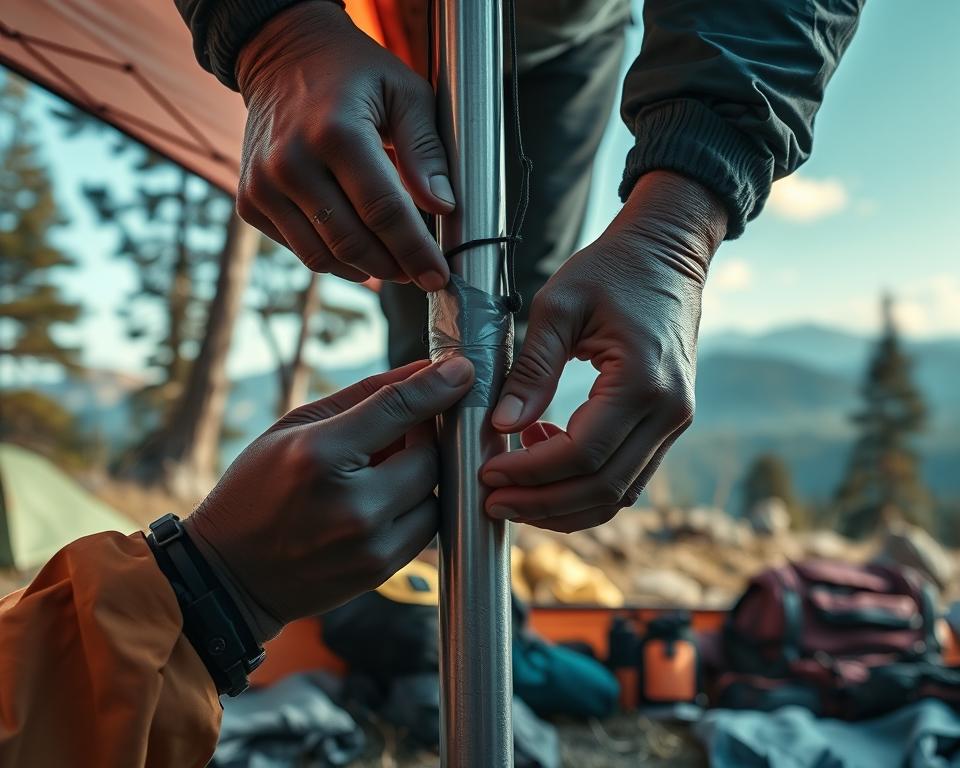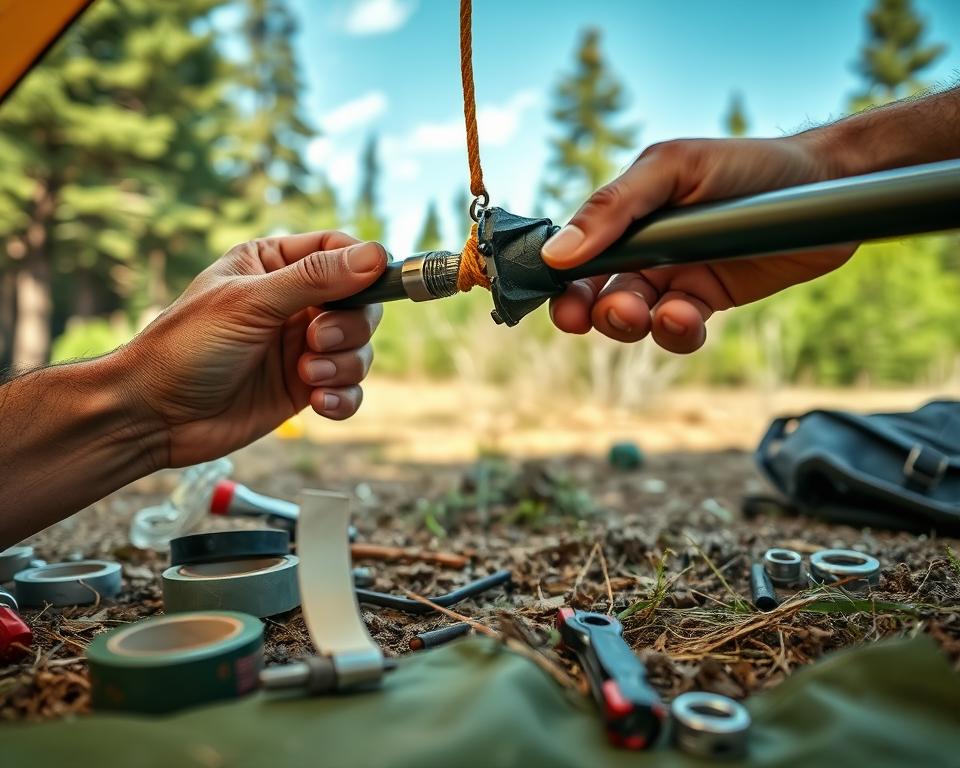Being good at fixing tent poles is key for keeping your tent stable. Tent poles are often damaged by weather or by accident. It’s important to know the materials they are made from and how they are put together.
Fixing your own tent poles saves money and is better for the planet. Harry Sandler, a top repair tech, believes most people can do it themselves. Shops like TentPole Technologies, REI, and Big Agnes offer help if you need it.
If your tent pole breaks or bends, having the right tools can help you fix it quickly. You can usually repair them with duct tape, pliers, and a repair sleeve. But be careful with aluminum and fiberglass poles, as they can be sharp or splintery.
Always try to get replacement parts from your tent’s maker. When fixing shock cords, you’ll need pliers with a cutter, new shock cord, and something to mark with. This makes sure the cord works right and doesn’t cause problems.
Learning to fix tent poles means your outdoor trips go smoothly. With the right preparation and tools, you’ll see that this task is easy, even outdoors.
Understanding Tent Pole Basics
Before fixing your tent poles, it’s crucial to know about the materials and common issues. This knowledge boosts your skill in future repairs.
Types of Tent Poles: Fiberglass vs. Aluminum
Tent poles are mainly made of two materials: fiberglass tent poles and aluminum tent poles. Fiberglass poles are flexible, making them break more easily under a lot of pressure. Aluminum poles, known for their strength, can bend if mishandled. All poles divide into sections connected by shock cords. This keeps them together when you set up or take down your tent.
Common Causes of Tent Pole Damage
Knowing why tent poles get damaged can help you prevent problems. Tent poles can get damaged by:
- Bending: This is more usual in aluminum tent poles, due to too much force or wrong handling.
- Breaking: This happens mainly in fiberglass tent poles, caused by strong winds or physical stress.
- Worn-out shock cords: Over time, the shock cords that join the pole segments may weaken or break, needing a change.
- Damaged pole hubs: The pole hubs that link different sections can get damaged over time, leading to unstable poles.
Knowing these issues means you can better prepare and fix them. For example, you can often fix slightly bent aluminum tent poles carefully, but you must replace broken fiberglass tent poles. Also, having extra shock cords and pole hubs helps make repairs quicker and easier during camping.
Identifying the Problem with Your Tent Pole
When checking your tent poles, it’s key to catch issues early. This keeps camping fun and hassle-free. Problems can range from bent poles to ones that have snapped. It’s important to correctly identify what’s wrong. Recognizing the damage type helps fix it quickly and effectively.
Bent Poles: Signs and Solutions
Bent poles are common and can mess up tent setup. Look for poles that don’t line up or seem bent out of shape. They can bend due to heavy winds, not setting up right, or by being crushed. To straighten a bent pole, carefully bend it back. Use smooth pressure all around.
If the bend is bad, you might need a splint or sleeve. These tools help keep the pole stable and useable.
Broken Poles: How to Spot and Address
Broken poles need quick action. They might crack or break completely because of stress or material flaws. During your check, if you see cracks, epoxy glue can fix them well. For poles broken in two, gather all pieces. You might need a splint or even a new section.
Repair kits are handy for these fixes. They ensure your tent is safe and ready for more adventures.
Essential Tools and Materials for Tent Pole Repair
Heading into the great outdoors? It’s crucial to carry essential tent repair tools. Whether it’s a small fix or a big issue, having the right tools can keep your camping fun.
Tape Options for Quick Fixes
Quick fixes are vital when you’re camping. Duct tape for camping is a must-have. It offers strong, temporary support to damaged poles. You can also use gaffer tape or athletic tape for quick, reliable fixes.
Using Splints and Repair Sleeves
Broken or severely bent tent poles need a tent pole splint or a repair sleeve. Aluminum tubing splints work well for aluminum poles. Fiberglass poles might need replacing. Having these with you means you’re ready for whatever comes.
Importance of Carrying a Multi-Tool
A good multi-tool for outdoor gear fixes is key. It can include pliers, wire cutters, and scissors. This tool makes adjusting and fixing poles easy. A kit with steel files and glues also helps a lot.
Right tent repair tools are game-changers for camping trips. From duct tape to a strong multi-tool, having these ensures you’re ready. This way, your adventure continues smoothly, even when pole problems happen.
Step-by-Step Guide on How to Repair a Tent Pole
Fixing a tent pole may seem hard, but with this guide, you’ll become a repair expert quickly. By going through the details of fixing a tent pole, your camping trips will be smoother.

Preparing the Damaged Area
First, understand how much damage there is. This means looking over the tent pole closely. Then, clean it with a cloth to remove any dirt.
- Gather your tools: tape, multi-tool, spare pole section, and sandpaper.
- If the pole has splinters or sharp edges, smooth them out with sandpaper to prevent further damage.
- For bent poles, gently bend the pole back into shape with your hands or use pliers for precision.
Using a Splint for Broken Poles
If the pole is totally broken, you’ll need a splint. Here’s a quick guide on how to use a tent pole splint.
- Align the broken segments: Hold the pieces together in their original positions.
- Apply a splint: Use a tent sleeve or stake as a splint, centering it over the break.
- Secure the splint: Wrap duct tape around the splint and the pole, ensuring it’s tightly bound to prevent movement.
Brands like Tentpole Technologies or MSR’s Pole Repair Kit make good splints, simplifying the process.
Replacing a Shock Cord
Need to swap the shock cord in your tent pole? Follow these steps to make it easy.
- Remove the old shock cord by disassembling the pole sections.
- Measure a new piece of shock cord, about 75% the length of the pole, for the best fit.
- Thread the new shock cord through each pole section, using a metal rod or wire to help if needed.
- Tie a knot at each end of the shock cord to keep it in place.
- Put the pole sections back together, making sure the cord is tight enough to keep them snug.
With this guide to fixing tent poles, you’re ready to tackle common repairs. This includes using a splint or swapping the shock cord. This way, your equipment will be ready for many more camping trips.
Advanced Repair Techniques
For seasoned campers or outdoor enthusiasts, learning advanced tent pole repair can greatly enhance your camping. Knowing how to maintain your tent makes it last longer and prepares you for the wilderness.
Utilizing Professional Repair Kits
A good repair kit is crucial for complex repairs. Brands like Big Agnes and retailers like REI offer excellent repair kits. These kits include strong splints, durable tape, and new shock cords for full solutions. For tough repairs, these kits provide the right tools. Yet, for something like replacing a shock cord, you’ll need precise tools and knowledge on knots.
When to Seek Professional Help
If your tent pole is severely damaged, simple fixes may not work. In such cases, expert tent repair services are the best choice. Companies like TentPole Technologies specialize in repairing outdoor gear, ensuring your tent’s pole is as good as new. Tools like a wire or a coathanger help in initial checks before consulting experts. Professional help ensures your tent is fixed right and lasts longer, especially when the right tools and skills are essential.
How Can I Repair a Tent Pole if the Tent Floor is Already Ripped?
If your tent floor is already ripped, tackling the repair can still be manageable. First, reinforce the area around the tear to ensure stability. Then, focus on the pole—use strong adhesive tape to hold it in place. Follow these easy steps to repair tent floor and enjoy your camping trip again.
Preventive Measures and Maintenance Tips
To make your camping gear last longer, take good care of your tent poles and maintain your gear well. Buying high-quality tents from trusted manufacturers is a smart first step. This ensures your tent is strong and can last a long time. Whether you go camping often or just sometimes, clean your tent after each trip or every once in a while. Tents have waterproof layers that get worn out, so reapply protection every few years to keep them working well.
Tent poles need to be treated gently. Don’t snap them together quickly as that can harm their joints. Check your poles often for any damage and fix problems right away. To keep poles clean and in good shape, spray them with a mixture that’s 70% methylated spirits. It’s also key to make sure your poles and tent pegs are totally dry before you pack them up. This stops damage caused by moisture.
Setting up and storing your tent the right way can hugely increase how long it lasts. Make sure to set it up correctly to avoid issues like sagging or breaking poles. Using a ground cover that’s a bit smaller than your tent can stop water from gathering. Keep your tent stored in a place that’s cool and dry to avoid mold. Also, applying a water repellent to the fabric, taking care of zippers, and staking your tent properly in the wind help keep your gear in top shape. Doing these things means you can have safe and cozy shelter for many more camping trips.

